Nov 2021 1st edition
Nov 2021 1st edition Estelle Greeff
English PDF version
Translations
Afrikaans
isiNdebele
isiXhosa
isiZulu
Sepedi
Sesotho
Setswana
Siswati
Tshivenda
Xitsonga
Applications are open for the 2022 National Arts Festival
Applications are open for the 2022 National Arts Festival SiboneloArtists and producers are invited to submit applications for an opportunity to showcase their work at the 2022 National Arts Festival.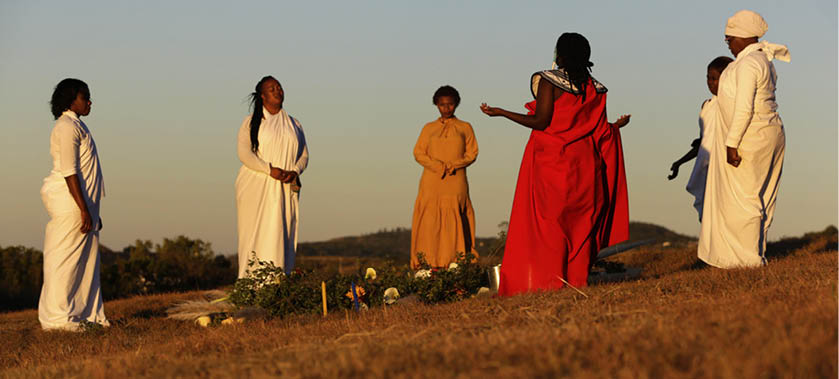
Applications are already open and will close on 12 November.
The National Arts Festival is the biggest annual celebration of the arts on the African continent. It aims to create a space for artists and audiences to come together, engage and create unique cultural experiences over 11 days.
The festival’s Chief Executive Officer Monica Newton says the call for applications is for finished works that are for live production only.
“The call for the 2022 National Arts Festival Fringe will be announced separately. A call will also go out for online works early in 2022,” she says.
The festival will take place in Makhanda in the Eastern Cape, from 23 June to 3 July 2022. Newton is hoping that it will be back to its live format.
“The past two years have been unexpected and unpredictable. It has been a journey that has taken us into new formats and ways of delivering work.”
Every year, the programme includes drama, dance, physical theatre, comedy, opera, music, jazz, visual art exhibitions, film, student theatre, street theatre, lectures, a craft fair and workshops.
How to apply
- Applicants must submit the following information:
- A short biography of the artist;
- Brief biographies of all artists involved;
- A description and history of the work or project;
- Short summary;
- Project description;
- What pandemic considerations you have had to make, or could consider making, in the event of audience or travel restrictions;
- A budget to make or prepare the work and travel it, showing where you have other investments already and where you need to raise additional funds.
Applications must be submitted online at https://nationalartsfestival.co.za/national-arts-festival-2022-call-for…
For more information, email info@nationalartsfestival.co.za or call 0860 002 004.
Artisans can become entrepreneurs
Artisans can become entrepreneurs SiboneloYouth are making a living as artisans after being trained through a National Youth Development Agency (NYDA) and Services Sector Education and Training Authority skills development programme. 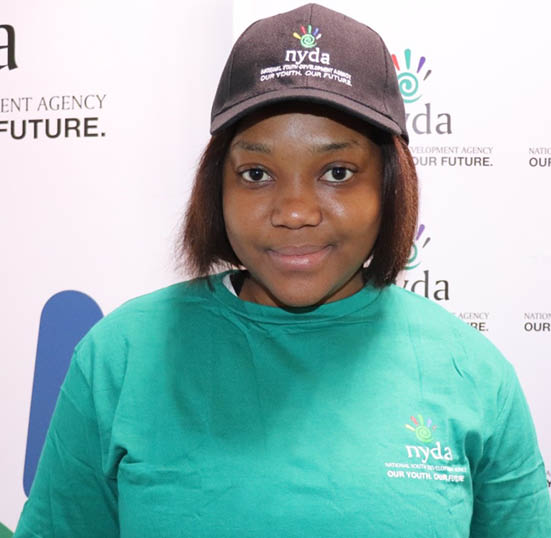
Thapelo Nsimbini (26) from kaMhlushwa in Mpumalanga has qualified as a fitter through the Technical Skills Programme.
She trained in fitting and turning at the Technotrain Industrial Training Academy in Kempton Park, Gauteng.
Fitters and turners are highly skilled craftsmen who manufacture, construct, assemble and fit components for machinery.
The training, which included two-and-a-half-years of theory and a six-month practical, enabled Nsimbini to develop skills she now uses to earn a living.
The training taught Nsimbini how to maintain and rebuild heavy-duty machines, used for making and maintaining bolts, shafts and other heavy-duty equipment.
“I learnt how to measure the inside of shafts, which helps to align the wheel of a car. I can also change the bearings of an industrial water and oil pump,” Nsimbini says.
She is now opening her own bearing manufacturing and refurbishing business. “Training as an artisan not only opens jobs, but can also enable one to be an entrepreneur,” she says.
To become an artisan you can enrol at a technical vocational education and training college or any registered private higher education institution that offers these courses.
To study towards a National Qualification Framework (NQF) Level 1 in boiler making, fitting or turning, you must have passed Grade 9 with mathematics and physical science. The entry requirement for an N3 qualification is a Grade 11 pass, with mathematics and physical science.
During the course, students learn mathematics, engineering science, engineering drawing, fitting and machining and mechanotechnology from N1 to N3.
To take part in the programme, contact the NYDA at 087 158 6345 / 5738 or visit www.nyda.gov.za.
Climate change: We must act now
Climate change: We must act now UrsulaFrom the Union Buildings
It is no exaggeration to say that the world is facing a climate crisis of unprecedented proportions.
Climate change presents serious health, environmental and economic risks for our country. These risks will have increasingly damaging effects on human health, water availability, food production, infrastructure and migration.
Many South Africans are already feeling the effects of climate change through drought and flooding, which have an effect on their livelihoods.
Several communities in Mpumalanga, for example, are affected by high levels of pollution, which increases respiratory illness and other diseases.
Those who are dependent on the ocean for a living have already seen depleted fish stocks amid changing weather patterns and changes in ocean temperature.
There are broader economic risks. As our trading partners pursue the goal of net-zero carbon emissions, they are likely to increase restrictions on the import of goods produced using carbon-intensive energy. Because so much of our industry depends on coal-generated electricity, we are likely to find that the products we export to various countries face trade barriers and, in addition, consumers in those countries may be less willing to buy our products.
The other economic risk is that investors will shy away from investing in fossil fuel powered industries. Banks and financial institutions are already facing pressures from their shareholders not to finance enterprises that depend on fossil fuels to produce their products or services.
All these emerging trends mean that we need to act with urgency and ambition to reduce our greenhouse gas emissions and undertake a transition to a low-carbon economy.
We however need a transition that is just because there are several important sectors of our economy that will be negatively affected by such a transition, including agriculture, tourism, mining, energy, transport, manufacturing and the biodiversity economy.
The process of transition needs to be based on the full involvement of organised labour and business in targeted programmes of reskilling and upskilling, creating employment and providing other forms of support to ensure workers are the major beneficiaries of our shift to a greener future.
As a country, we are developing detailed plans to enable a just transition. Our electricity sector, which contributes 41% of South Africa’s greenhouse gas emissions, will be the first phase of the transition.
We will be decommissioning and repurposing coal-fired power stations, and investing in new low-carbon generation capacity, such as renewables. We will also pursue ‘green’ industrialisation, such as manufacturing using green technology and a shift to the production of electric vehicles.
South Africa is endowed with abundant resources that can be harnessed to open up new frontiers of investment and growth and build a new economy in areas like green hydrogen.
By pursuing these opportunities, we can ensure that our just transition yields new innovative opportunities that will create new jobs.
We are working together with different partners across society in mining towns in Mpumalanga to assess the potential impact of a move away from coal, and ways to ensure that communities are protected against the risks and benefit from the opportunities presented by this transition.
Eskom will be undertaking a pilot project at its Komati power station, which is due to shut down its last coal-fired unit next year, to produce power through renewable energy.
To signal our increased ambition, Cabinet recently approved our updated Nationally Determined Contribution (NDC), which sets out our emissions targets towards net-zero carbon emissions by 2050. This sets a target range for emissions, from restricting global warming to less than 2 degrees Celsius at the top of the range, with the bottom of the range compatible with the goal of restricting warming to less than 1.5 degrees Celsius.
Where we get to in this range depends on the support we get for our transition.
Increased ambition cannot be achieved without the support from the more developed economies living up to the promises they have made in the past to provide financial support to developing economies. This needs to be in the form of grants, loans at concessional rates and private investment.
This is not about charity. It is about fairness and mutual benefit. Countries with developed economies carry the greatest responsibility for climate change as they have historically been the biggest polluters, while developing economies are the worst affected. That is why wealthier countries have an obligation to provide significant financial support for developing economies to adapt to climate change and reduce emissions.
As the world prepares for the COP26 climate summit, there is a window of opportunity to mobilise additional climate finance.
The climate transition is something that affects every South African and we all need to be part of its design and implementation. We have undertaken widespread consultation and there is broad support among social partners for an ambitious, realistic and, most importantly, just transition.
We have to act now if we are to achieve sustainable and inclusive growth, secure the health and well-being of our people and safeguard the future of our planet.
EMS play a vital role in fighting COVID-19
EMS play a vital role in fighting COVID-19 UrsulaParamedics and other emergency medical services workers have been on the frontline during the Coronavirus Disease (COVID-19) pandemic. 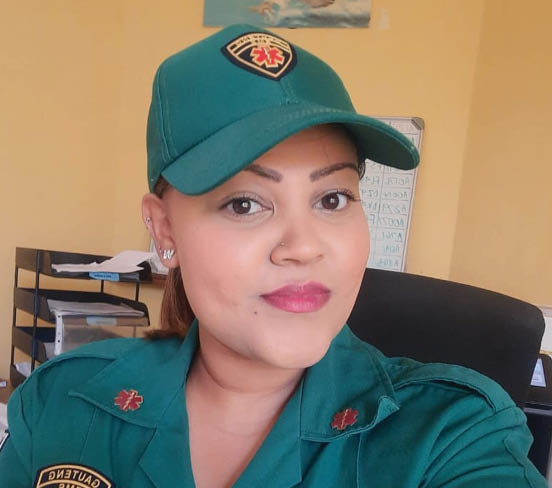
Intermediate life support medic Waseela Mohammed (29), the Shift Leader at Gauteng Emergency Management Services (EMS) at the City of Johannesburg, says the past year-and-a-half has been tough.
“Being a medic isn’t easy. It involves responding to a crisis, dealing with the possibility of death and staying cool at a time when it’s needed most,” she says.
The pandemic has impacted almost every aspect of life, caused global economies to stall, changed the way we work and interact with loved ones and stretched healthcare systems to the limit.
“It has been challenging to work… We’ve had to embrace the new normal and change how we normally do things to ensure transformation and innovation ," she says.
Being on the frontline and transporting critically ill patients, Mohammed says paramedics have seen more deaths in a day, than they normally would in their shift cycle. “As a result, staff members are emotionally, physically and mentally drained, but we persevere,” says Mohammed.
She urges people to vaccinate against COVID-19, as it is still the most effective method of preventing hospitalisation and death.
“Getting vaccinated is important to protect yourself and those around you. Get vaccinated even if you have already had the virus. Vaccinate today, so that tomorrow everyone is together!”
For more information about vaccination and vaccination sites, visit www.sacoronavirus.co.za or call the COVID-19 Public Hotline at 0800 029 999.
Funding for food projects
Funding for food projects SiboneloThe Western Cape Department of Agriculture has invested in two community-based agricultural projects in a bid to tackle food insecurity in the province. 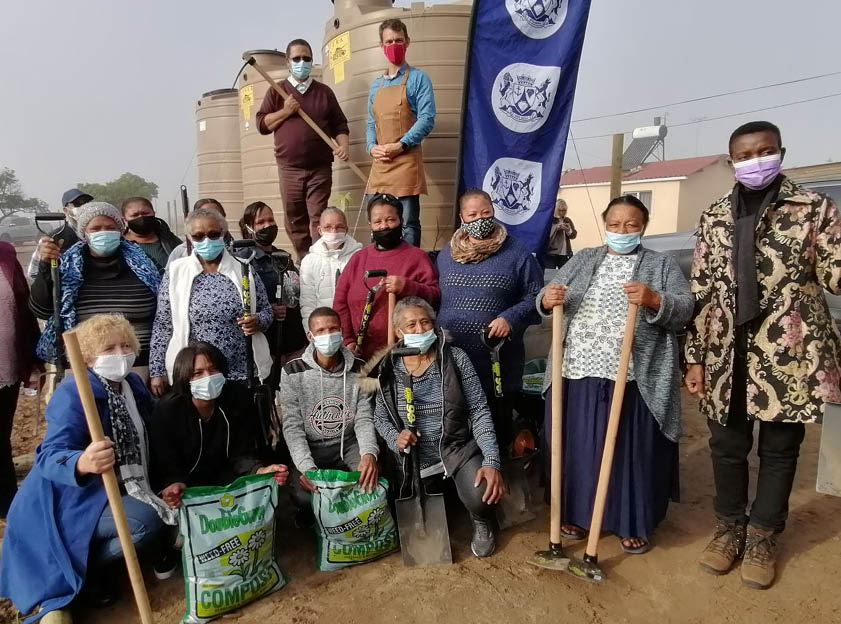
These projects are the Middelpos Farm and Greenhands Community Food Garden Project in Stompneus Bay.
Western Cape Agriculture MEC Ivan Meyer says his department has allocated over R2 million to the Middelpos Farm and R198 000 to the Greenhands project.
The funding was prompted by food insecurity, a lack of jobs and low household income in the area.
“The budget for these projects was determined after an assessment by the department’s extension officials in the area. We envisage that this funding will boost the projects’ ability to provide communities with sustainable food sources,” he says.
Meyer adds that the funding for Middelpos Farm will allow for the establishment of an agro-processing plant, improved mechanisation and production input for vegetables. The funding will also help with current farming activities.
A study by the provincial government on household food and nutrition security in the region has revealed that food insecurity in the Western Cape is most prevalent among black and coloured population groups, with African households making up 53% and coloured households constituting 41% of those with inadequate access to food.
The study also shows that vulnerable groups include women-headed households.
The Middelpos Farm is 60 hectares and has 15 families who are direct beneficiaries of the farm’s produce. Current farming activities include olives, Shiraz grapes, vegetables, agro-processing and arts and crafts aimed at project sustainability and skills transfer.
Petronella Ponie, a team leader of the Greenhands project, says her initiative came about when 15 residents – 14 women and one man – came together to start a food garden after most of them battled to find work after the Coronavirus Disease (COVID-19) outbreak last year.
“The ground which we have turned into a food garden was previously a large dumping ground. We put in some hard work to establish the garden to provide our families and the community with a sustainable source of affordable and nutritious food," she says.
Gabisile Cengimbo heads to the polls for the first time
Gabisile Cengimbo heads to the polls for the first time SiboneloYoung people ready to vote in local government elections.
Gabisile Cengimbo (18) will cast her vote for the first time on 1 November in the Municipal Elections. She says she is using the opportunity to voice her need for change.
Cengimbo, from Sigangala village in the Eastern Cape, believes the youth should lead South Africa. “This is what will inform my vote.”
By voting, Cengimbo is also able to select a candidate she believes will ensure that roads are developed and running water installed in her village.
“At the moment, the people in my village need to have tanks. If you don’t have a tank, you don’t have access to clean water. When I was a kid, taps were installed in my village, but they soon ran dry,” she says.
Cengimbo encourages her peers to vote, in the interests of their communities. “The most important thing is to vote. We won’t all vote for the same party, but we must vote so that we can use that vote for progress in our community,” she says.
Voting also enables Cengimbo to add her voice to issues affecting the country as a whole. She says even though local government elections are for voting for local government structures, the vote she casts now will grow her political party’s support.
Durban resident Khululekile Gaga (47), who has been voting since the age of 20 in 1994, says he has seen his life improve under the democratic government.
Since his first vote in 1994, he has seen the construction of a school, community water taps and roads in his home village. “Our votes have really made a difference. Within five years, we had already received electricity,” he says.
Much like Cengimbo, Gaga also believes the youth should lead in terms of political activism.
According to the Electoral Commission of South Africa, 180 040 youth between the ages of 18 and 19 are among the 26 million South Africans who have registered to vote.
GoodMen protect women and children
GoodMen protect women and children tsoanaA group of concerned men has come together and established an organisation to contribute to the fight against gender-based violence and femicide (GVBF).
The founder, Smangaye Xaba, says the GoodMen Foundation (GMF) encourages men, from all communities across South Africa, to actively participate in creating social change to heal and build communities.
The group does not only want to condemn viol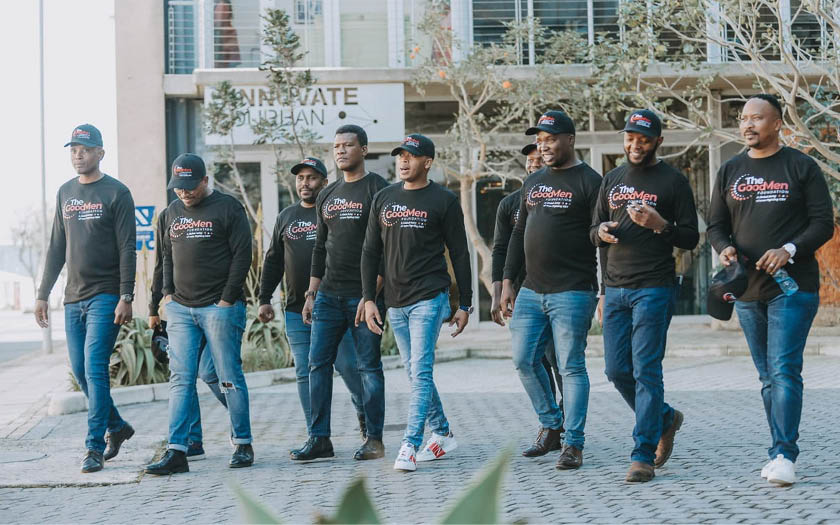 ence after an incident, it has also formulated various programmes to curb GBVF, including community-based dialogues that inform and empower community leaders to become active GBVF champions.
ence after an incident, it has also formulated various programmes to curb GBVF, including community-based dialogues that inform and empower community leaders to become active GBVF champions.
“Local councillors, religious leaders, school principals and business leaders are empowered to coordinate dialogues in their respective spaces of influence, working with the GoodMen Foundation.
"These robust dialogues are not only for men, but also women and youth,” he says.
The foundation has also taken its initiatives to institutions of higher learning.
The Tertiary GBV Alleviation Programme aims to create a safe environment for staff and students to report sexual offences, provide trauma counselling for victims and ensure justice is served.
Xaba says the foundation also wants to establish safe centres at different institutions, to drive awareness campaigns and host staff and student dialogues.
Through its events, the organisation is also running a pledge campaign to get one million men to sign a pledge against GBVF.
“We want to inspire one million conversations and one million actions against GBVF, in five years. Men are being mobilised to participate in the International Men’s Walk for Change, a march through communities, especially hotspots,” he says.
A member of the foundation, Soweto Mandlanzi, says his contribution is to mentor young men who need guidance and father figures.
Men from all walks of life have to rise up in their communities and show leadership in social ills. “We know part of the problem is the vicious cycle of a lack of guidance as young men grow up, and the neglect of boys in some families. I believe it is useless if I do not speak out, do something right and protect women,” he says.
Help for healthcare workers
Help for healthcare workers Ursula A Johannesburg-based psychiatrist and her colleagues are helping healthcare workers cope with the pressures of working during the Coronavirus Disease (COVID-19) pandemic.
A Johannesburg-based psychiatrist and her colleagues are helping healthcare workers cope with the pressures of working during the Coronavirus Disease (COVID-19) pandemic.
Dr Antoinette Mirric offers four free counselling session through the Healthcare Workers Care Network (HWCN), which she founded.
Mirric treats healthcare workers who are struggling with anxiety, post-traumatic stress disorder (PTSD) and severe stress.
“Our clients also deal with stress and grief from losing a loved one or colleague to the pandemic. We help them through this.”
The HWCN works with the South African Society of Psychiatrists, South African Medical Association, Psychological Society of South Africa, South African Depression and Anxiety Group (SADAG) and the South African Society of Anaesthesiologists (SASA).
In addition to counselling, Mirric also coordinates counselling sessions with other mental health professionals.
To date, the HWCN has helped over 500 healthcare workers, including administrative staff, and put in over 450 hours of individual and group therapy sessions.
The sessions are conducted using the World Health Organisation-approved Psychological First Aid (PFA) method. “After the first session, where we deploy PFA, my colleagues and I use supportive counselling to help the person get through whatever trauma they experienced,” says Mirric.
She adds that the HWCN uses volunteer counsellors, through SADAG’s 24 Hour Helpline (0800 21 21 21). Healthcare workers can call the helpline and provide details of the help they need. SADAG then sends this information to HWCN, who contacts the client.
The HWCN also has an emergency mental health crisis intervention programme that transports, accommodates and treats healthcare workers who have a mental health emergency.
It also trains supervisors how to assist their employees.
“We conduct online training for non-healthcare managers and staff in healthcare environments, which helps them identify the warning signs of burnout, depression and PTSD in their team,” Mirric says.
The Convenor of the SASA Wellness in Anaesthesia Support Group, Caroline Lee, says the HWCN’s help is really needed as healthcare professionals are under severe pressure.
“Healthcare professionals are also stressed, exhausted, deeply worried and at risk. It is critically important to be as supportive as possible of doctors, nurses, healthcare support staff and allied medical personnel,” says Lee.
To get assistance from the HWCN, visit www.healthcareworkerscarenetwork.org.za, send an SMS to 43001 or use the EMGuidance and Vulamobile apps.
Jobs: Provincial Representative X2 Posts (Re-Advertisement), Oct 2021
Jobs: Provincial Representative X2 Posts (Re-Advertisement), Oct 2021 tsoanaThe following positions exists within the Public Protector
1x Location: Western Cape (Ref: PPSA 01/08/2021)
1x Location: Eastern Cape (Ref: PPSA 02/08/2021)
Remuneration Package: R1, 285 158.00 all-inclusive package per annum
Note: Candidates who previously applied for these positions need not to re-apply as their applications will still be considered.
Closing date: 25 October 2021 at 16H30
Visit our website www.publicprotector.org for details on these positions including the process to follow when applying.
Nowinile Majola brings beans and maize to the market
Nowinile Majola brings beans and maize to the market SiboneloA small-scale farmer is working the land to help break the cycle of poverty in her community. 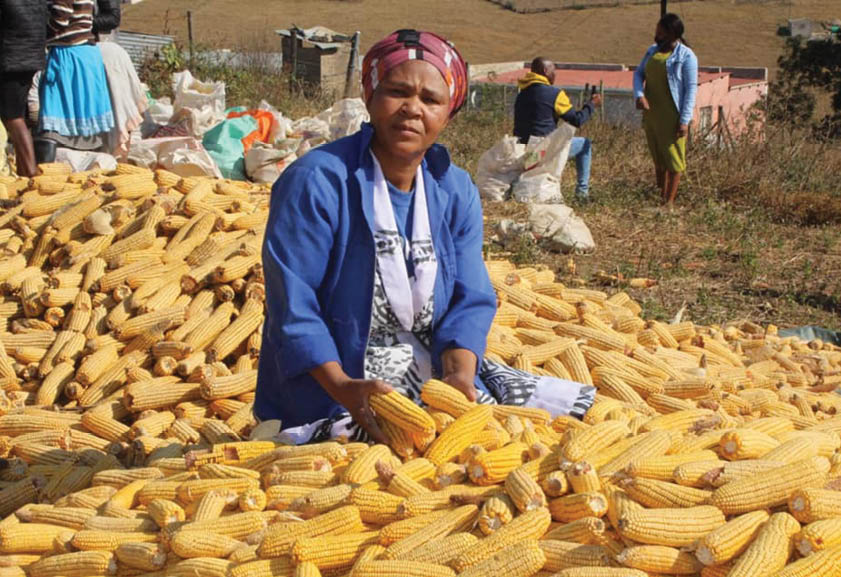
Former businesswoman Nowinile Majola (53) has become a successful small-scale farmer in Mhlanga village in the Eastern Cape.
She is part of the Majola Agricultural Primary Cooperative that has four other members and sells maize and beans to businesses as far afield as KwaZulu-Natal.
The cooperative received support from the Eastern Cape Department of Rural Development and Agrarian Reform (DRDAR) and the Alfred Nzo District Municipality.
Majola initially started a small garden project on a piece of community land.
When her crop yield proved to be much larger than she anticipated, she was able to sell some produce in her community.
In 2015, she formed the cooperative with four other members. They farm on 10-hectares of land leased from the local chief and employ seven casual workers. Due to its growth, the cooperative has also been able to purchase a maize sheller and a bakkie to deliver produce to local markets.
“To work the forefathers’ land has always been my dream. Now, I’m ready to pass the baton to my kids, to go forward with farming,” says Majola, who has also started a project to help feed other families.
The cooperative aims to stop poverty and prevent crime by encouraging youth to take part in agriculture.
Majola says this is so that young people can provide for themselves and become entrepreneurs.
Anele Jojo, the Agriculture Development Technician for DRDAR at Alfred Nzo District Municipality, says the department is also developing farmers by helping them to negotiate offtake agreements. “We help the Majola Agricultural Primary Cooperative with production inputs, mechanisation and accessing the markets.”
The district municipality assisted the cooperative with fencing.
“This was a great help as livestock tend to be a problem when the fields are not fenced,” says Majola.
For more information, contact the Department of Rural Development and Agrarian Reform at 0800 203 025 or visit www.drdar.gov.za.
Pregnant and breastfeeding women should vaccinate
Pregnant and breastfeeding women should vaccinate SiboneloCOVID-19 VACCINATION during pregnancy and breastfeeding is considered safe for both mother and baby.
Although the risk is small, pregnant and postnatal women are at increased risk of severe Coronavirus Disease (COVID-19), compared to non-pregnant women.
According to the Vaccine Ministerial Advisory Committee (VMAC), pregnant women who contract COVID-19 also have an increased risk of preterm birth and other complications.
As a result of the growing body of safety evidence that supports the use of COVID-19 vaccines in pregnant women, the VMAC recently updated its recommendations regarding the administration of COVID-19 vaccines during pregnancy.
The new recommendations state that COVID-19 vaccination should be offered to eligible women. In South Africa, eligible women are those aged 18 and over, during any stage of pregnancy and while breastfeeding. Both the Pfizer and Johnson and Johnson vaccines can be offered to these groups of women.
Some of the benefits of vaccination for pregnant women, which outweigh any known or potential risks, are the strong immune response following vaccination and immune transfer to the baby.
The Centre for Disease Control says women who fell pregnant after receiving their first shot of a COVID-19 vaccine that requires two doses, should get their second shot to get as much protection from the virus as possible.
In addition, it says that there is currently no evidence that any vaccine, including COVID-19 vaccines, cause fertility problems in women or men.
Breastfeeding and the vaccination
The World Health Organisation and South African Health Products Regulatory Authority recommend that breastfeeding women get vaccinated against COVID-19. They also recommend that these women continue to breastfeed after vaccination.
As none of the COVID-19 vaccines use a live virus, getting vaccinated cannot infect you or your breastfeeding baby with the virus.
There is also some evidence that, after vaccination, antibodies are found in breastmilk, which may help protect the baby against COVID-19.
For more information about COVID-19 vaccines, visit www.sacoronavirus.co.za.
Presidential Employment Stimulus set to create jobs
Presidential Employment Stimulus set to create jobs UrsulaOver half a million South Africans have already benefitted from Phase 1 of the Presidential Employment Stimulus (PES). This is evidence that government is committed to creating jobs and ensuring economic growth. Government is now intensifying these efforts with the launch of phase 2. 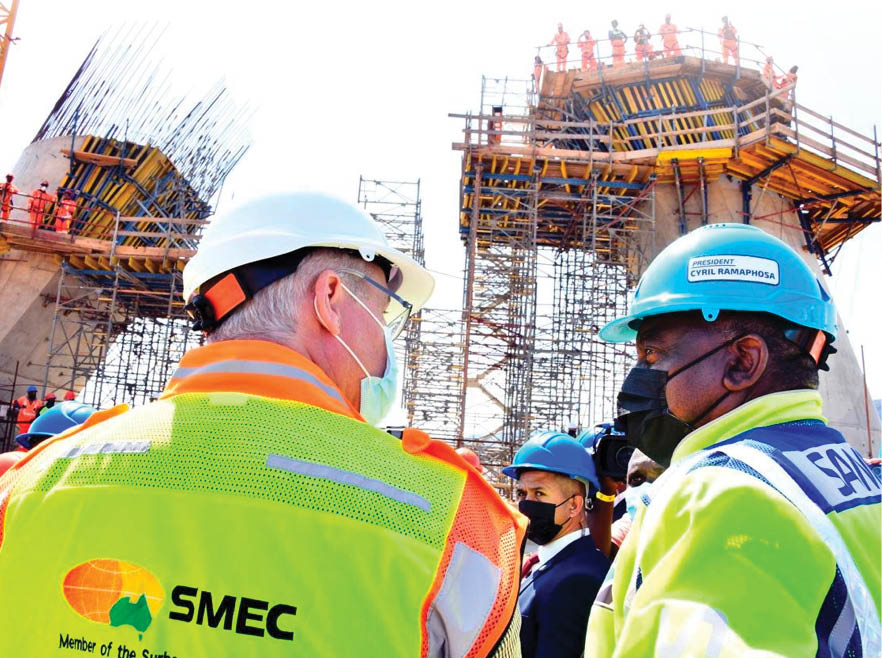
The PES was launched by President Cyril Ramaphosa in October 2020, in response to the devasting impact of the Coronavirus Disease (COVID-19) pandemic on employment.
After achieving significant milestones in Phase 1, Phase 2 of the PES was recently launched by Minister in the Presidency Mondli Gungubele, Minister of Employment and Labour Thulas Nxesi and Minister of Public Works and Infrastructure Patricia De Lille.
“The PES is a crucial pillar of the broader economic Reconstruction and Recovery Plan, and supports a portfolio of programmes in three key areas – public employment interventions, livelihood support to sustain self-employment, and protecting existing jobs in vulnerable sectors,” said Minister Gungubele.
What’s new in Phase 2
Phase 2 has already commenced and will be implemented with a budget of R11 billion, allocated by National Treasury.
“It will support the continuation of some programmes from Phase 1, and a range of new ones,” Minister Gungubele confirmed.
Some of the programmes include:
- Recruitment of 287 000 young people as school assistants, which is already underway. Participants will be placed in November 2021;
- Establishment of a new Social Employment Fund, which forms part of the Social and Solidarity Economy Strategy. It will support non-governmental organisations to create 50 000 jobs;
- Support for the Presidential Youth Employment Intervention, to provide support and expand opportunities for unemployed young people – R838 million has been allocated to this programme;
- The National Pathway Management Network (NPMN), also known as SA Youth, which enables youth to register to receive active support to find employment. Youth can access the programme through various platforms, including the zero-rated SA Youth mobi platform;
- Establishment of an Innovation Fund, for partners of the NPMN, working with the Jobs Fund. The fund will identify and support innovative solutions to barriers faced by youth in the labour market;
- Revitalisation of the National Youth Service (NYS), by employing 35 000 youth:
- Support of demand-led training, as a new approach to skills development, that links training to youth and jobs;
- Extension of the Department of Agriculture, Land Reform and Rural Development’s (DALRRD) produce input voucher programme for subsistence farmers;
- A programme to support innovation in public employment in the metros, to be rolled out through the Neighbourhood Development Partnership Programme in National Treasury;
- A new programme that incorporates new models for waste recycling, which are being tested in 25 municipalities;
- Support for graduate employment, by placing 3 000 graduates in universities in work that uses their professional skills;
- A programme with the Department of Communication and Digital Technology to establish a Broadband Access Fund to support connectivity for 50 000 households.
Phase 1 achievements
Eleven national government departments were responsible for implementing various programmes in Phase 1.
Over 550 000 jobs and livelihoods were supported during the first phase, against a target of 694 120 – representing over half a million South Africans who benefited directly, said Minister Gungubele.
“Several programmes are still in implementation and we expect this number to increase,” he added.
Phase 1 achievements include:
- Benefiting 551 000 people, against target of 694 000, of which 85% are youth and 58% are women;
- Total jobs created: 393 713, against a target of 434 000 (91%);
- Livelihoods supported: 117 000, against a target of just under 200 000 (60%);
- Jobs retained: 40 000, against a target of 60 000 (67%);
- The placement of 170 000 youth in various work opportunities through the NPMN;
- The Basic Education Employment Initiative set a target of 300 000 opportunities across 22 000 schools. It exceeded expectations, achieving 320 000 recruitment opportunities. A national minimum wage was also introduced for these youth;
- The DALRRD supported just over 53 000 subsistence farmers with production vouchers;
- The Department of Forestry, Fisheries and Environment employed 35 000 people in existing environment programmes;
- The Department of Social Development’s Early Childhood Development Programme supported over 32 000 practitioners;
- Over 40 000 people were supported in the arts and culture sector.
The PES is set to bring more South Africans into the labour force in greater numbers in a short space of time.
Reach out to grieving loved ones
Reach out to grieving loved ones tsoanaMonica Ndindwa tragically lost her four-year-old daughter Chumalethu who drowned in a swimming pool in 2013.
Ndindwa battled to come to terms with the untimely passing of her child. She says people deal with grief in different ways and, when death strikes, it’s vital for people to have support.
“Partners must be available and in touch emotionally. They need to understand each other’s grief, allow the process to take its cause and be there for each another through it all,” she says.
Many people battle with depression after losing a loved one, but Ndindwa says she did not. She immediately attended therapy sessions after the burial. “The sessions helped me deal with my loss.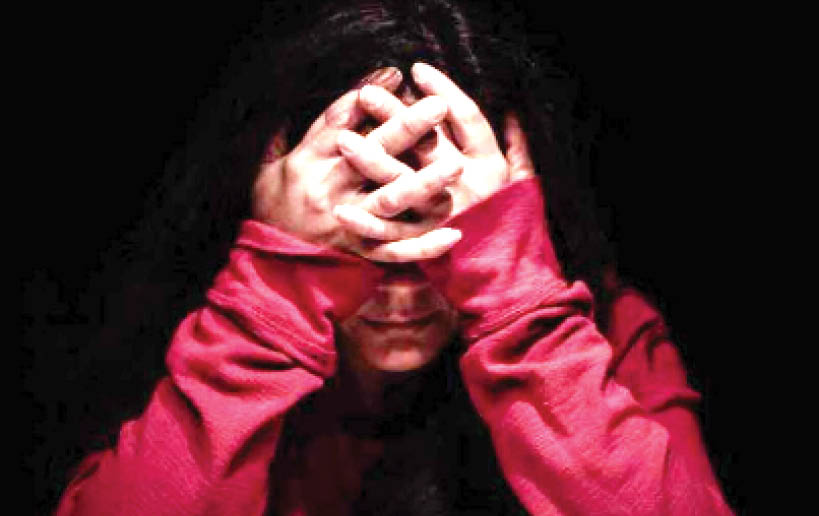
"Also, my faith played a huge role in understanding and accepting.”
Ndindwa says people go through a range of emotions when they lose a loved one, including denial.
“When I lost my daughter, I thought I will be able to deal with the loss. Loss is not felt when you are with people, it hits you when you are alone. The day I saw her coffin go into the ground, it hit me that I would never see my daughter again."
When not at work, Ndindwa now helps others through their grieving process.
Clinical psychologist Zamo Mbele says it’s important to get professional help after losing a loved one, to avoid depression.
He says public primary healthcare clinics refer people to psychologists and organisations, such as the South African Depression and Anxiety Group (SADAG), that offer psychological services.
“Assisting a loved one dealing with depression is important. Be there, listen when they are expressing themselves and ask relevant questions.
"You can also do research and approach organisations like SADAG to find out how you can help the person,” he adds.
For more information call SADAG’s Suicide Crisis Line at 0800 567 567, its Mental Health Line at 011 234 4837 or Lifeline at 0861 322 322.
Relief for agricultural sector
Relief for agricultural sector SiboneloFarmers, farmworkers and communities affected by devastating natural disasters, such as wildfires, can now apply for assistance from the Agri SA's new Disaster Relief Foundation.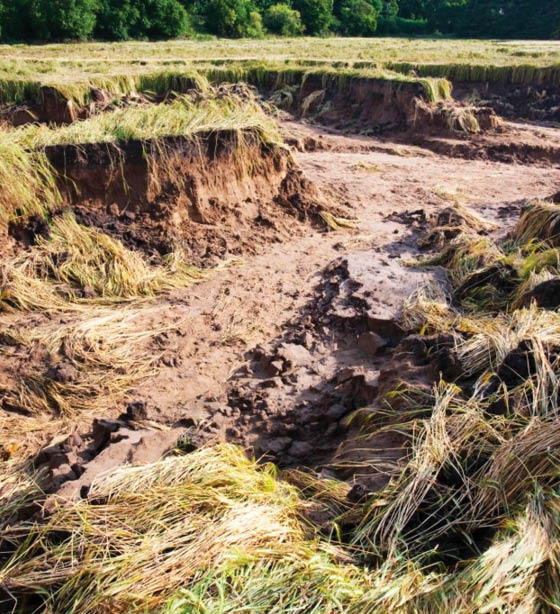
The Manager of the Risk and Disaster Unit at Agri SA, Andrea Campher, says the foundation aims to supply food packages, under the management of the Surplus Food Aid campaign, to farmers, farmworkers and needy communities suffering from food insecurity.
“Beneficiaries can get assi-
stance packages in the form of fodder, infrastructure, transport costs and humanitarian aid,” Campher says.
To get assistance, applicants must approach Agri SA’s provincial and municipal offices that will perform need assessments before forwarding the application to Agri SA.
Agri SA interventions to offer relief to the agricultural sector are not new. In 2015, Agri SA’s Drought Relief Fund was established to address challenges brought by drought, but due to the sector experiencing other disasters as well as the drought, a foundation had to be set up to address broader challenges.
“Since 2015, over R30 million has been distributed to farmers and farmworkers, through Agri SA’s provincial and commodity affiliates, towards disaster aid in the agricultural sector,” Campher says.
For more information, email Agri SA: agrisa@agrisa.co.za or support@agrirelief.org or call 012 643 3400.
Sisters building a greener future
Sisters building a greener future SiboneloTwo innovative entrepreneurs are helping to save the environment by recycling plastic waste into bricks.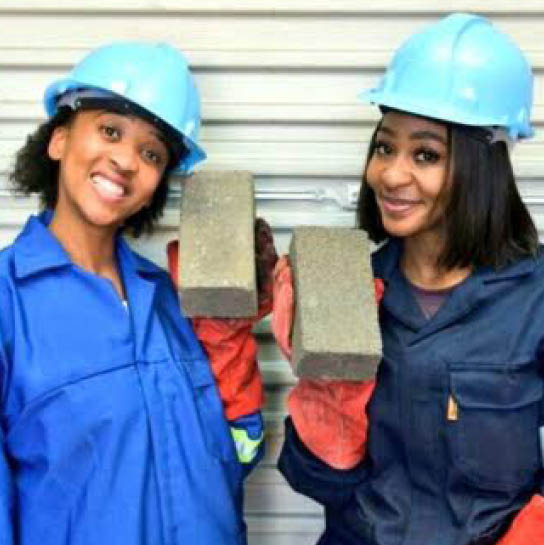
Sisters Kedibone (32) and Kekeletso (28) Tsiloane are providing a sustainable solution to waste pollution by using plastic to manufacture bricks.
The sisters, who are from Sasolburg in the Free State, are joint CEOs of Ramtsilo Manufacturing and Construction, which they established in 2013.
According to Kedibone, the bricks are made from 30% recycled plastics. They last longer than conventional bricks, as the plastic acts as a binding force and less water enters the brick. This also limits cracks and increases a building’s lifespan.
“They weigh about 2kg and have a 2% moisture absorption rate. They are manufactured in such a way that plastic will never leak into the environment, even after a building is demolished,” says Kedibone.
“They are also very effective in resisting fires and help to save electricity, as they retain heat in winter and stay cool in summer,” she adds.
No water or cement is used during the manufacturing process.
The bricks are moulded and left to cure until they have reached the required strength.
Kedibone says the bricks are approved by the National Home Builders Registration Council.
Saving the environment
Making recycled bricks assists with limiting plastic pollution, as the plastic does not end up as waste.
“We collect plastic from waste pickers, packaging corporates and waste management companies. All the plastic waste is stored and processed on our site, ensuring that none of it ends up in waste streams, such as landfills, or our rivers and drainage systems,” Kedibone explains.
The company, which has already created eight permanent jobs in the recycling and construction industries, also makes cement pavers and builds houses, and the bricks have been used in low-cost housing.
The bricks can be bought directly from Ramtsilo Manufacturing and Construction or at certain Builders Warehouse stores in Gauteng.
For more information, visit www.ramtsilo.com.
Soweto Canoe Club aims to change lives
Soweto Canoe Club aims to change lives SiboneloThe Soweto Canoe Club situated in Orlando is reaching out to the youth and teaching them new skills.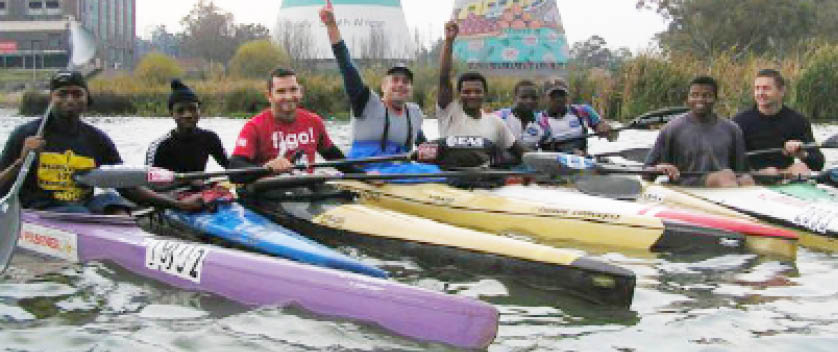
While water sports are not hugely popular in townships, the Soweto Canoe Club is working hard to change this.
Founded in 2003 by ADreach Chief Executive Officer Brad Fisher, the Soweto Canoe club has 72 members, ranging from seven to 22 years old.
Fisher formed the club due to a lack of black Gauteng paddlers.
“Initially, we noticed that there were little to no water sports in the area. We collaborated with Emmarentia-based Dabulamanzi Canoe Club to develop a similar club in Soweto. Our club is different, as it is also a skills development centre, where youth are assisted with their studies and personal growth,” he says.
Coach Nkosi Mzolo, who joined the club in 2006 when he moved from KwaZulu-Natal, says it has done a lot of groundwork to demystify superstitions and overcome traditional beliefs that spirits live in lakes and rivers.
“In townships, there are many negative nuances about large masses of water, so this was the first barrier the club had to overcome. It also helped that we don’t only concentrate on the sport, we also provide academic support, career guidance, shadow employment opportunities and personal development courses,” he adds.
The club encourages members to be independent and successful.
Mzolo was fortunate to be employed as a driver at the club, and received financial support for his emergency management services studies at the City of Johannesburg. He has now qualified as a paramedic and firefighter rescue technician.
“With unemployment a problem in the country, the vast majority of our members are unemployed and depend on social grants. Here they get to acquire a new skill, that may lead to employment, and they receive food parcels.”
The club has produced some of the best paddlers in the country, including Siseko Ntondini, who became the first black South African to achieve a podium finish at the Hansa Fish Canoe Marathon in 2015.
For more information contact the soweto Canoe and Recreational Club on 074 341 6545 or www.scarc.co.za.
Tank factory creates jobs in Komani
Tank factory creates jobs in Komani SiboneloA tank manufacturer is creating job opportunities and reviving industrialisation in Komani in the Eastern Cape. 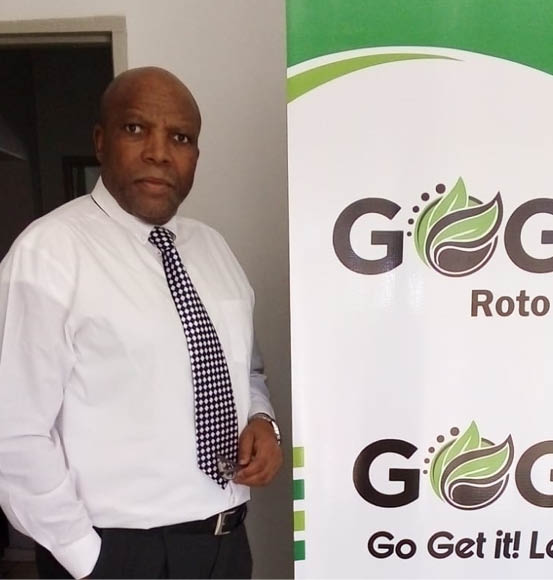
Manufacturing company Go Green Roto Moulding, owned by 62-year-old Michael Ntwasa, is using what was once a dilapidated factory to manufacture water and biodegradable tanks that are sold throughout the Eastern Cape.
Ntwasa says Go Green Roto Moulding, which employs 24 permanent employees, makes 72 tanks daily thanks to the assistance it received from the Small Enterprise Finance Agency (Sefa) and the Chris Hani Development Agency.
Sefa gave Ntwasa R1.6 million in funding and bought him machinery worth R5.6 million. Sefa also spent R600 000 renovating the building that was given to Go Green Roto Moulding by the Chris Hani Development Agency.
“The assistance from Sefa really made our dream come true. The Chris Hani Development Agency is the one that got us off the ground when they handed us the factory,” Ntwasa says.
Sefa supported Go Green Roto Moulding through its Small Enterprise Manufacturing Support Programme (SEMSP).
Innocent Ndima, the spokesperson for Sefa, says SEMSP provides financial, business development and infrastructure support to small enterprises in the manufacturing industry sub-sectors.
These sub-sectors include furniture manufacturing; metal and steel manufacturing, chemical manufacturing, and agro-processing.
Manufacturers can get up to R15 million in funding from Sefa.
To ensure that the support provided to upcoming manufacturers is not in vain, Ndima says Sefa ensures that government buys its products from local manufacturers.
For more information on the SEMSP, visit www.sefa.org.za or send an email to helpline@sefa.org.za. Alternatively, call Sefa at 012 748 9600.
Vaccination programme extended to children
Vaccination programme extended to children UrsulaGovernment has extended its Coronavirus Disease (COVID-19) vaccination programme to include children aged 12 to 17 years old. The Department of Health recently announced plans to vaccinate this age group. 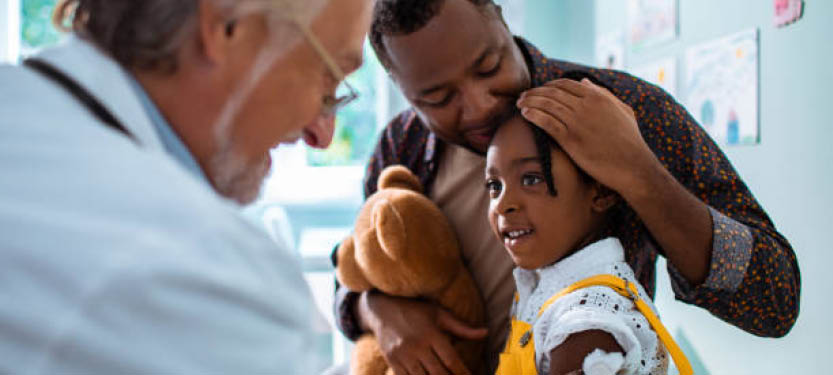
Briefing the media in Pretoria recently, Health Minister, Dr Joe Phaahla said the latest development in the national vaccination rollout programme follows a recommendation received from the Ministerial Advisory Committee (MAC) on COVID-19 Vaccines.
The recommendation was also supported by Health MECs and Cabinet.
However, according to the Minister, MAC has advised that a single dose of the Pfizer jab should be administered for now, as approved by the South African Health Products Regulatory Authority (SAHPRA).
The MAC recommended the delay of administering the second dose due to concerns about rare cases of myocarditis – heart muscle inflammation, with a few cases reported across the globe after a second dose.
“The MAC has advised that while this is being monitored all over the world at this stage, there has been no indication that the first dose has any serious side effects. So for now, it will be just one dose while the studies are continuing,” he said.
“We believe that it will still offer significant protection, and once more information comes, we can space the second dose for the young people.”
In South Africa, adults receive two doses of the Pfizer vaccine.
The Minister has assured parents and teenagers that even when these cases have been reported, they had no permanent risk.
“So we're just taking precaution in this case,” he stressed.
According to the Department of Health’s Acting Director-General, Dr Nicholas Crisp, there are about six million youngsters in the secondary school cohort.
Children will be vaccinated at all public and private vaccination sites. – SAnews.gov.za
Vote safely during COVID-19
Vote safely during COVID-19 SiboneloIf we all work together, we can help keep each other safe from COVID-19 on voting day.
With the Local Government Elections set to take place on 1 November, the safety of voters and staff during the Coronavirus Disease (COVID-19) pandemic is a top priority for the Independent Electoral Commission (IEC).
Participating in the Local Government Elections is important because municipal councils play a crucial role in providing services to people. By voting, you can have a say in what happens in your community. Your vote is your voice to choose your government.
The IEC, which has called on all eligible voters to cast their ballot on 1 November, has put a COVID-19 protocol guide together to assist voters and let them know what to expect on voting day.
COVID-19 protocol guide
Voters must:
- Wear a face mask, as per lockdown regulations for all people in public places. If you don’t have a mask or face cover, the election officials will refuse you entry into the voting station and you will not be able to vote.
- Keep a distance of 1.5 metres from other voters, election officials, party agents and observers at all times.
- Wait your turn before entering the voting station, as only a limited number of people may be gathered inside the venue at the same time.
- Sanitise your hands before you enter and leave the voting station.
- Bring your own pen for marking your ballots. If you have to use a voting station pen, don’t worry as these will be sanitised after each use.
- Wait after your thumbnail has been inked to ensure that the ink has dried before your hands are sanitised when leaving the voting station.
- Politely speak up if people are too close to you, or if anyone’s behaviour makes you feel uncomfortable.
All election staff will be provided with a disposable face mask, face shields, disposable cardboard bins, sanitiser wipes, hand sanitisers, disinfectant fogger sprays and social distance markers.
* Information supplied by the Electoral Commission.
For more information about the Local Government Elections, visit www.elections.org.za or call the Contact Centre at 0800 11 8000.
Vuk’uzenzele newspaper is FREE
Vuk’uzenzele newspaper is FREE Sibonelo
What will people say?
What will people say? Sibonelo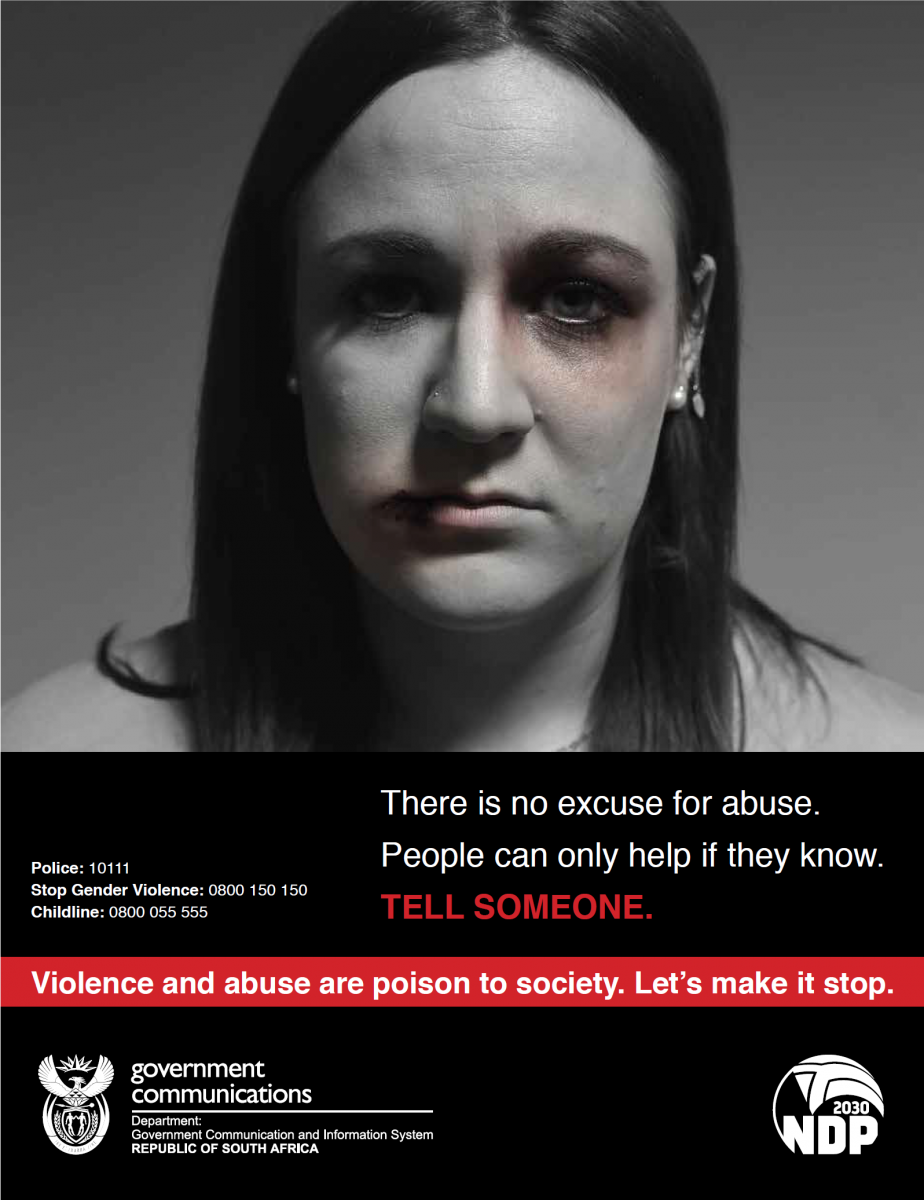
Youth speak up about vaccination
Youth speak up about vaccination SiboneloFour young people from across South Africa share their stories with Vuk'uzenzele on why they choose to be vaccinated against the Coronavirus Disesase (COVID-19).
Bokamoso Molale (23)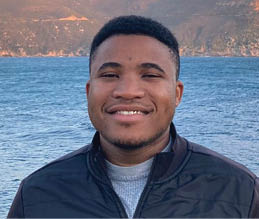 from Welkom in the Free State received the Johnson & Johnson (J&J) jab on 30 April 2021 – earlier than other people his age because he is a medical student.
from Welkom in the Free State received the Johnson & Johnson (J&J) jab on 30 April 2021 – earlier than other people his age because he is a medical student.
“I experienced mild side effects including fatigue and a headache, but they only lasted for about 24 hours,” he says.
Molale adds it was important for him to get vaccinated to lower his chances of getting the virus again. He tested positive for COVID-19 in August 2020.
“I realised that I can never be too careful, so I chose to get vaccinated to protect myself and my patients,” he says.
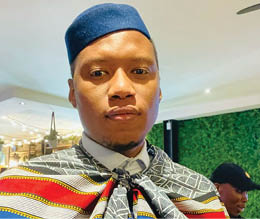
Bokang Job (30) from Tshwane received the J&J vaccine on 1 September.
He had red eyes, fatigue, a high temperature and drowsiness, but recovered within 48 hours.
“I chose to be vaccinated because I want my life to be as stable as it was before the COVID-19 outbreak. My livelihood was drastically impacted by the national lockdown,” he says.
Job also tested positive for COVID-19 in October 2020 and learnt that his life is precious.
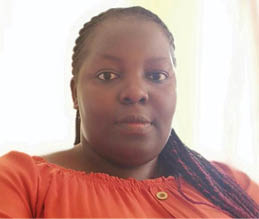
Lungile Mavimbela (29) lives in Alberton in Ekurhuleni. She received her Pfizer jabs on 16 August and 29 September and experienced only mild side effects.
“I chose to be vaccinated because I have lost friends and family members to the disease. I do not want to be part of the stats,” she says.
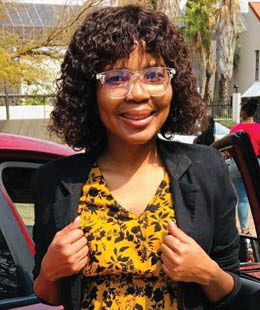
Gontse Motsumi (34) from Mafikeng received her Pfizer vaccine and experienced two days of fatigue and tenderness around the injection site.She also tested positive for COVID-19 in January this year, and that made her realise how short life is.
“I want the majority of the country to be vaccinated so that we can fully engage in activities that are now prohibited,” she says.
The J&J and Pfizer vaccines that are currently being administered in the country have proven to be safe and effective.
The Pfizer vaccine requires two doses to provide maximum immunity. People who have received their first dose will need to have a second dose 42 days later.
It is important to get fully vaccinated for the vaccine to be effective. The J&J vaccine requires a single dose to provide protection against COVID-19.
Visit www.https://vaccine.enroll.health.gov.za to register for your vaccine.
